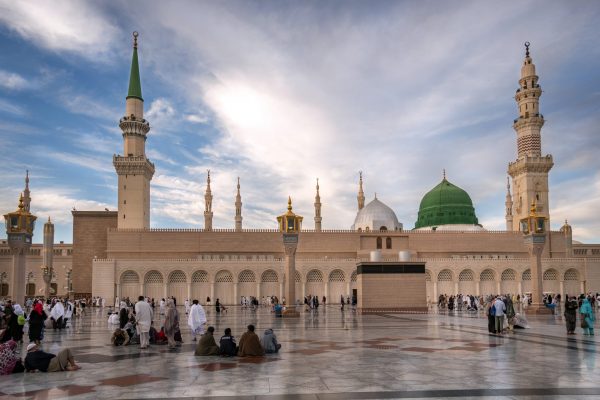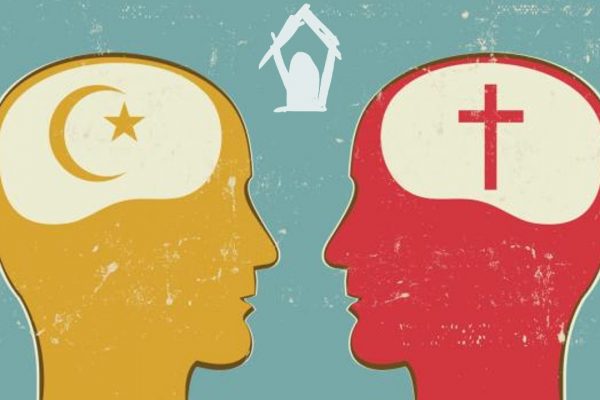Almost all parents love their children much more than they love the children of their neighbors. This is only natural. Most parents are also able to acknowledge that some of their neighbor’s children exceed in merit their own children in some, even occasionally in many, aspects of character, personality or talent.
Nevertheless, parents still love their own children much more than their neighbor’s children. The same preference is also found among religious believers.
In every religious community, people think that their prophet, their holy book, their saints, and their religious traditions are the truest and the best. This natural human feeling can sometimes lead to an arrogant pride that results in verbal abuse and physical conflict between believers of different religions.
This arrogant pride in the superiority of one’s own religion should be condemned by all religious leaders. An excellent example of this is found in the Sunnah of Prophet Muhammad when he was called upon to judge between a Jew and a Muslim in a conflict-laden situation.
Abu Huraira related: Two men, a Muslim and a Jew, abused each other. The Muslim said, “By Him Who gave superiority to Muhammad over all the people.” At that, the Jew said, “By Him Who gave superiority to Moses over all the people.” The Muslim became furious at that and slapped the Jew in the face. The Jew went to God’s Apostle and informed him of what had happened between him and the Muslim.
God’s Apostle said, “Don’t give me superiority over Moses, for people will fall unconscious on the Day of Resurrection and I will be the first to gain consciousness and behold! Moses will be there holding the side of God’s Throne. I will not know whether Moses has been among those people who have become unconscious and then has regained consciousness before me, or has been among those exempted by God from falling unconscious.” (Bukhari Volume 8, Book 76, #524)
God’s Messenger is so well known for his sense of justice that a Jew can appeal to him even in a conflict with a Muslim who has attacked a Jew. It is only natural for Jews to think that Moses is the best, and for Muslims to think that Muhammad is the best. Muhammad rebukes the Muslim, telling him not to claim that Muhammad is superior to Moses because even on the day of Resurrection, Muhammad himself will not know their relative merit, for although Muhammad will be the first of all the comatose to be revived, Moses will already be there holding the side of God’s throne.
Why Abraham Is An Excellent Example For All Abrahamic Faiths
Muhammad teaches us that claims of religious superiority are wrong, for no human in this world, and perhaps even in the world to come, will know who is the best prophet. Such arrogant comparisons do not help anyone to become a better believer in God, but only polarizes believers by inciting partisan fervor.
I am a Reform Rabbi, and I can state that all Reform Rabbis would applaud this teaching of the Prophet Muhammad because we are all aware that during the Middle Ages, all three religions claimed religious superiority over each other.
If Jews, Christians, and Muslims had only followed this teaching of the Prophet Muhammad, we could have avoided many centuries of bloodshed and massacres: three of the worst examples being the many Christian Crusades in Spain, Poland and the Middle East; the Roman Catholic Inquisition in Spain and Portugal; and the 30 year war between Catholics and Protestants in Germany and central Europe.
Most Americans would be amazed to hear such a liberal and tolerant statement coming from a religion that they think is ridged and fanatical. But the politicized Islam that has captured so much attention in the world today is not true Islam. It is the outgrowth of an anti-western reaction and scapegoating due to the great dislocations and upheavals occurring in Muslim societies as a result of the globalization taking place in all modernizing societies in the twentieth century.
But the Prophet Muhammad himself predicted that in future centuries Muslims also would become more rigid and orthodox, just as the Jews and Christians had.
In a well known Hadith, Abu Sa’id al-Khudri reported God’s Messenger as saying: You will tread the same path as was trodden by those before you inch by inch and step by step, so much so that if they had entered into the hole of a lizard, you would follow them in this also. We said: Do you mean Jews and Christians? He said: Who else?” (Imam Bukhari vol.4 Book 56, Number 662)
Islam did not become as strict in practice as Orthodox Judaism, or as strict in theology as Trinitarian Christianity, because Islam was meant to be an easy religion as this Hadith testifies, narrated Abu Huraira: The Prophet said, “Religion is very easy and whoever overburdens himself in his religion will not be able to continue in that way. So you should not be extremists, but try to be near to perfection and receive the good tidings that you will be rewarded.” (Bukhari: Volume 1, Book 2, Number 38)
Unlike Christianity, both Islam and Judaism teach the importance of the sacred slaughter of meat, and the avoidance of certain animals for food. In Islam, the rules are simpler and fewer than in Orthodox Judaism.
Reform Rabbis regard the increasingly restrictive developments in the laws of kosher diet, especially for Passover, as a counterproductive, overburdening of the Jewish people by extra-pious Orthodox rabbis. The expansion of restrictions on Shabbat activities is also seen by Reform Rabbis as a counterproductive, overburdening of the joy of Shabbat.
Muhammad wisely differentiates between extremism and striving to be near perfect (no one is perfect) which involves a rejection of extremism. Just trying to do well will be rewarded. Religion should not be hard. Making religion easier does not mean making religion soft or impious.
This is a very important Hadith because all religions have believers that think that more is always better and that much harder is still better.
The same restraint from becoming super pious is evident in the treatment of women during their menses. Thabit narrated from Anas: Among the Jews, when a woman menstruated, they did not dine with her, nor did they live with them in their houses (share the same bed); so the Companions of the Apostle asked God’s Messenger, and God revealed this verse to him: “They ask you about menstruation; say it is a pollution, so keep away from woman during menstruation”. (Qur’an 2: 222)
The Messenger of God said: Do everything except intercourse. The (Orthodox) Jews heard of that and said: “This man does not want to leave anything we do without opposing us in it.” (Sahih Muslim: Book 003, Number 0592)
Both Islam and Judaism have laws about ritual pollution deriving from a woman’s monthly period. Orthodox Judaism had greatly expanded the prohibitions against having sex during a woman’s period. Muhammad opposes this expansion and limits the prohibition for Muslims.
Reform Rabbis today are much closer to Islamic practice than they are to Orthodox Jewish practice. On the other hand, although Orthodox Jews do require their women to cover their hair, they never, even in Muslim countries, forced their woman to cover their faces with a veil.
In the 7th century, when Muhammad was spreading Islam, almost all the Jews of Arabia and the Middle East were Orthodox Jews. Had the Jews of Medina been more open to his teachings, Reform Judaism would have started 14 centuries ago and not just 2 centuries ago.
Of the 13 million Jews in the world today the majority, both in Israel and throughout the world, are no longer Orthodox. The largest denomination of non-Orthodox Jews in the US and Canada, where 6 million Jews live, is the Reform movement. Reform Judaism began in Germany almost 200 years ago as a “back to the basics” modernizing movement.
I am a Reform Rabbi who first became interested in Islam 60 years ago when I studied Islam at the Hebrew University in Jerusalem. I have continued my study of Islam off and on since that time. I consider myself to be a Reform Rabbi and a Muslim Jew.
Actually, I am a Muslim Jew, i.e. a faithful Jew submitting to the will of God, because I am a Reform Rabbi. As a Rabbi I am faithful to the covenant that God made with Abraham – the first Jew to be a Muslim, and I submit to the many commandments that God made with the people of Israel at Mount Sinai.
As a Reform Rabbi, I believe that Jewish spiritual leaders should modify Jewish tradition as social and historical circumstances change and develop. I also believe we should not make religion difficult for people to practice. These are lessons that the Prophet Muhammad taught 12 centuries before the rise of Reform Judaism in the early 19th century.
As the Qur’an tells us (17:110): “Say, ‘Call upon Allah, or call upon Ar-Rahman the Most Merciful. Whichever [name] you call – to Him belong the best names.’ And do not recite your prayer [too] loudly or [too] quietly, but seek a way in between.”
This ayah is the basis of Reform Judaism. God has 99 names not only because God has a complex personality; but also because different individual people, and different peoples/tribes/nations, relate to the one God in many different ways. Thus no one should raise his voice in prayer over others as though his prayers were better than those of others in his own community; or in other monotheistic communities.
Reform Jews are the largest of the Jewish denominations in the U.S. In the U.K., Reform Judaism is called Liberal Judaism. In many ways, statements in the Qur’an about Orthodox Jewish beliefs and Ahadith relating Muhammad’s comments about Orthodox Judaism, and religion in general, prefigures the thinking of Reform Rabbis some 12-13 centuries later.
Unlike Orthodox Rabbis, Reform Rabbis accept the doctrine of abrogation which teaches that one verse in scripture can abrogate another and that rulings can be changed due to changed circumstances. Muhammad provides an excellent example of this principle in the following account.
The Prophet originally told women not to visit graveyards, but toward the end of his life, he said to them: “I had told you not to visit graves; now I am telling you to visit them.” The reason was that Arabian women used to wail at graves.
The Prophet wanted this practice to be stopped. Therefore, he banned women from visiting graves to start with. After some time, when Muslim women were better aware of how Islam wants them to behave in different situations, he allowed them such visits.
In fact, the Prophet encourages visiting graveyards because such a visit reminds the visitor of his or her own death and the fact that they would have to stand in front of God when their actions are reckoned to determine their reward or punishment.
Scholars like Ibn Qudamah, of the Hanbali school of law, make it clear that since this is the purpose of visiting graveyards, both men and women need such visits.
The world’s most prominent religious leaders call on people to make friends from all religions
Another important teaching of the Qur’an for people all over the world today is that God chose not to create human beings as one nation and bestowed upon them free will to believe or not to believe.
As it is written in the Qur’an [5.48]: “For every one of you did We appoint a law and a way. If God had pleased He would have made you one people, but (He didn’t) that He might test you in what He gave you. Therefore compete with one another to hasten to virtuous deeds; for all return to God, so He will let you know (after Judgment Day) that in which you differed.”
This is a wonderful further development of the teaching of the Biblical prophet Micah (4:5) that at the end of days—the Messianic Age—“All people will walk, each in the name of their own God, and we shall walk in the name of the Lord our God forever.”
A Muslim is one who submits to the will of God and believes that God has sent many different prophets to the many peoples of the world. As a Reform Rabbi, I believe that Muhammad was the Prophet sent to the Arab people and all polytheists. I believe that the Qur’an is as true for Muslims as the Torah is true for Jews.
Indeed, I love the Hadith also narrated by Abu Huraira that says, “The people of the Book used to read the Torah in Hebrew and then explain it in Arabic to the Muslims. God’s Apostle said (to the Muslims). ‘Do not believe the people of the Book, nor disbelieve them, but say, ‘We believe in God, and whatever is revealed to us, and whatever was revealed to you.'”
Following Muhammad’s teaching, I too neither believe nor disbelieve in the Qur’an. If I believed in the Qur’an I would be a member of the Muslim community. If I disbelieved in the Qur’an I would be a member of the atheist community or of those religious communities that think that only their religion is the one true religion.
I do respect the Qur’an very much as a kindred revelation given in a kindred language, to the descendants of a kindred people. In fact, the people, the language and the theology are closer to my own people, language and theology than that of any other on earth.
Of course, more than 80% of Muslims in the world today are not of Arab descent. But Arabic is their sacred language and the tradition that Arabs and Jews are cousins is widely accepted.
This makes the present conflict between the Palestinians and the Israelis especially tragic. It is very important to realize that the conflict is a political one and not a religious one.
There can be no religious conflict between religions like Judaism and Islam because neither of them declares that their scriptures are the only ones from God.
The strong support that the Qur’an gives to religious pluralism is a lesson that is sorely needed by the religious fundamentalists of all religions in the world today.
And followers of all religions should always repeat this teaching of Allah’s Messenger, “Prophets are half-brothers in faith, having different mothers. Their religion is, however, one.” (Muslim, book #030, Hadith #5836)
All prophets have the same father, who is the One God whose inspiration gives birth to their prophethood. However, each prophet has a different mother i.e. the nation and people as well as the period and age that he speaks to.
Thus all prophets are brothers in faithfulness to the One God, but their message differs from one another because it must be appropriate to their motherland (note that the Arabic word umm for mother derives from the same root as the word ummah), their mother people and their mother tongue. So, Makkah is referred to as Umm al-Qura, meaning the mother city or country; and similarly, Surah al-Fatihah is sometimes characterized as Umm al-Qur’an, meaning the mother source surah.
The words, the rituals, the customs and the specific aspects of ethics and morals of each prophet will differ, but the goal of living and loving according to Allah’s will is the same. Or as the great poet Jalal al-Din al-Rumi taught, “Ritual prayer can be different in every religion, but belief never changes.” (Fihi Mafih)





